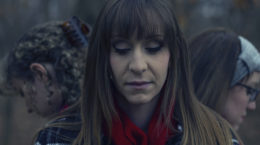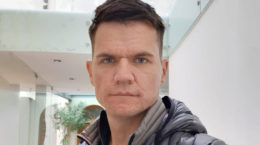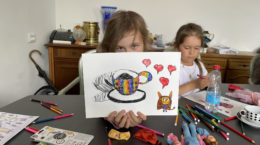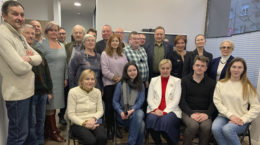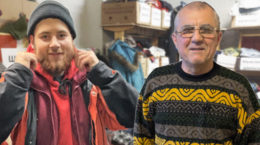When I was 13, my classmate, whom we all called “fat” because she was overweight, decided to tint her eyelashes. It wasn’t real makeup; she simply applied some mascara to her lashes. While she was walking down a school corridor, the principal noticed her tinted lashes. The principal grabbed my classmate by her hair and dragged her along the entire corridor, in front of numerous students, to a restroom. There, she smeared the mascara across my classmate’s face using cold, foul-smelling water. My classmate was crying, and we silently watched as an adult woman abused a child for simply using mascara. The mother was summoned to the school, sided with the principal, and punished my classmate at home. We all judged the girl, saying, “Can you believe it? She’s so fat, and she dared to wear makeup!”
It was forbidden to apply mascara to our lashes at school. It was even forbidden to dress the way we wanted to. We all had to wear the same unattractive uniform, which made us uncomfortably hot in summer and freezing cold in winter; it was also incredibly itchy. Every evening, we had to undo the dress collar, wash it, and sew it back on. It was a pointless ritual that consumed an enormous amount of time.
At school, we were taught how to assemble and disassemble Kalashnikov assault rifles, as well as how to shoot.
I did not know at the time that smearing mascara on a child’s face with water from the toilet, the endless sewing of collars, the assembly and disassembly of Kalashnikov rifles, and many other things were all links in the same chain of the totalitarian patriarchal system.
I didn’t like any of that, but of course, I wasn’t familiar with terms like systemic violence, victim-blaming, social and gender inequality, bullying, gaslighting, domestic violence, and many others. Unfortunately, today, many young Belarusian girls are growing up in similar conditions and are unaware of these terms as well, even though they experience these phenomena every day. They also don’t know that other women should not treat them like that.
“I will not yield the presidential seat to a woman, although I consider a woman to be a magnificent creation of nature, unsurpassed. A woman is the most beautiful creation of nature, and I bow before her,” Lukashenko stated at a press conference in October 2011. He further added that “In Belarus, the president is the commander-in-chief, and it is not a woman’s role to walk in front of a formation wearing a skirt. This is not a woman’s business.”
I would say that this is a typical statement from a typical abuser who perceives women solely as sexual objects and beautiful playthings meant to “decorate the world.” He acknowledges only one possibility for our existence as weak and submissive beings. As soon as it comes to women’s participation in decision-making processes, distribution of power alongside with social benefits, or simply having control over one’s own bodies and destinies, Lukashenko’s patriarchal regime reveals its “ferocious grin”: “Oh, power is difficult, you don’t need it, and how can a woman in a skirt lead the army, anyway?”
Actually, women in Belarus actively wear pants. And besides, what kind of army is it that, upon seeing women’s legs in a skirt, immediately stops obeying, transforms into instinct-driven animals, and goes out of control?
In 2020, Lukashenko once again stood out and declared, “Our constitution is not for women. And our society is not yet ready to vote for a woman. Because, according to our constitution, the president is endowed with strong power,” once again emphasizing the same patriarchal narrative: a woman cannot govern because she is too weak to come to power.
In 2020, the largest protests in history began in Belarus, both against the rigged presidential election and the patriarchal dictatorship of Alexander Lukashenko. These events are often referred to as the ‘women’s revolution’ due to the significant participation of women and the leadership of three women who headed the joint opposition headquarters.
Why did women revolt in Belarus?
The system of ‘state slavery’ is practiced in Belarus. A striking example is related to obtaining higher education by young Belarusians. When a young woman or man, often from Belarusian regions and low-income families, receives a state diploma, according to Belarusian legislation, they are subjected to two years of compulsory labor service or required to pay a fine ranging from 10,000 to 25,000 euros as compensation for the alleged expenses incurred by the state. Typically, this involves being forced into low-paid, menial jobs under extremely poor conditions. Refusing to comply can lead to severe consequences such as debt bondage under Lukashenko’s regime and the revocation of the higher education diploma. Leaving such an imposed job voluntarily, without falling into debt bondage or facing significant economic repercussions (such as the seizure of valuable assets), as well as without political sanctions (such as a travel ban), is impossible under Belarusian legislation.
Therefore, in reality, all women in Belarus with a higher education who received it ‘free of charge’ (meaning they did not personally pay for their education) are victims of modern state slavery, fulfilling all the criteria of slaves, including a complete lack of rights and being subjected to humiliating, low-paid forced labor.
There is also a list of professions prohibited for women in Belarus, ranging from working as a firefighter to working as a diver. It is not surprising that all the professions prohibited for women in Belarus are generally highly paid, while difficult and poorly paid professions are traditionally occupied by women.
The Lukashenko regime has shifted the responsibility of addressing all social issues, including caring for elderly relatives, raising children, and other invisible and unpaid labor, onto the shoulders of Belarusian women, thereby saving budget funds.
Alexander Lukashenko perceives all Belarusian women as his personal slaves and possessions, whom he seeks to force into obedience and silence. This is why women who participated in the protests faced unprecedented levels of terror and violence, ranging from physical beatings to the abduction of children by KGB officers. They have been subjected to confinement in psychiatric hospitals and faced exorbitant fines amounting to thousands of euros. Approximately 18,000 days of imprisonment have been served by women involved in administrative prosecutions across almost 7,000 cases. In terms of fines paid in administrative cases, women have contributed about 800,000 euros (based on data known to human rights defenders). Many women have faced administrative prosecution several times.
As of October 13, 2020, the General Prosecutor’s Office of Belarus issued official warnings to over 300 families (primarily women) regarding the participation of their children in protests. The current number of such families is unknown, but it is likely that this figure has at least doubled. Prosecutors have acknowledged conducting “explanatory talks” with over 400 women and children. Presently, all families with children express concerns about the threat of having their children taken away due to their participation in protests.
But feminist human rights defenders evoke particular hatred from the Belarusian regime. These are women who have not given up or retreated, even if they had to flee the country. One such organization is mine, Our House, a feminist human rights organization that unites women defenders and has established a hotline to assist victims of repression. Among the people, these women are referred to as ‘owls’ due to their nighttime work in assisting the oppressed, as the KGB comes to arrest people at night, similar to the practices during the Soviet era. Some human rights defenders have also been arrested, but many others have managed to escape Belarus and continue their work, providing assistance to the oppressed from Lithuania. Since then, the regime has initiated a real hunt for women human rights defenders, even beyond the country’s borders.
Belarusian regime propagandists have publicly labeled Belarusian women human rights defenders, activists, and journalists in exile as “runaways,” implying a derogatory comparison to “runaway slave-women.” Propagandist Igor Tur presented a propaganda series called “The Lies of the Runaways” on the state TV channel, and later published a book with the same title, dedicated to Our House and other women human rights defenders, including journalists.
Our House and me have been recognized as extremists on nine occasions, with various accusations ranging from declaring human rights monitoring as “extremist materials” to the acknowledgement of the human rights center Our House itself as an “extremist organization”.
Since September 2021, the KGB has me on its terror list as number 773. Her information is published on the KGB website as that of an individual “linked to terrorist activities.” Furthermore, the Belarusian KGB has equated my human rights work and her assistance to victims of the 2020 repressions (such as providing support to prisoners, assisting with legal fees, and facilitating escapes) with the activities of an international terrorist from Libya, Osama Al Kuni Ibrahim. This terrorist is listed as number 774 on the KGB terror list, immediately following me. In comparison, Osama Al Kuni Ibrahim has been associated with the Zawiyah network for human trafficking and has been designated as an international terrorist by the United Nations Security Council Committee under resolution 1970 (2011).
On October 6, 2022, one of the major channels of Belarusian propaganda, Yellow Plums, claimed that I am, the director of the Belarusian human rights organization Our House, is a “Polish intelligence agent.” This false accusation was made following an act of humanitarian aid where Our House, in collaboration with the German human rights organization IGFM-Wittlich, delivered a truck of humanitarian assistance to Krakow, Poland, to support Belarusian and Ukrainian refugees in Poland.
Public death threats from the Belarusian security forces are regularly reported, including threats of kidnapping from Lithuania and forced return to Belarus in the trunk of a vehicle. On October 2, 2022, during the Nedelya program aired on STV, Deputy Interior Minister Nikolai Karpenkov made a statement saying, “Opponents of the Lukashenko regime who are abroad deserve death because they are possessed by the devil.” According to Karpenkov, these opponents are associated with satanic symbols, and he referred to them as “real mad dogs” who deserve death. Our House interprets the statements made on STV during the broadcast as a direct threat, particularly towards me. Previously, the program’s host, Grigory Azarenok, a Lukashenko’s propagandist, posted a photo on his social media with the word ‘devil’ written on my face, while comparing himself to an angel.
But even after that, the KGB didn’t cease its attempts to attack Belarusian women human rights defenders.
On September 28, 2022, in Lithuania, the Lithuanian State Security Department detained Mantas Danielis, a Lithuanian lawyer who had previously provided legal assistance to Our House in the first part of 2022. It was discovered that the Belarusian KGB had recruited this Lithuanian citizen to spy on Our House and its women human rights defenders. In other words, the activities of Our House and its human rights work had instilled such fear in the Belarusian KGB and security forces that they felt the need to recruit a Lithuanian citizen to spy on me and other women associated with Our House. Currently, Mantas Danielis remains imprisoned in Lithuania.
This indicates that Belarusian feminists have to work under extremely challenging conditions, even while in exile in Lithuania. Death threats, attacks, espionage attempts, and much more continue to persist to this day.
But this also indicates that Lukashenko perceives feminism and gender equality as one of the main threats, undermining the very essence of his patriarchal dictatorship and his role as a political abuser. It is he who is afraid of us, not us who are afraid of him, and this gives immense hope and inspiration to all Belarusian women who have not given up and continue their fight for women’s rights and peace.
It’s time to activate UN Resolution 1325 for Belarus and actively involve women human rights defenders and activists in peacebuilding processes. It is time for Belarusian women to loudly declare that they are not only against war, but also capable of handling any army in the world, whether in skirts or in pants. And if the Constitution of Belarus doesn’t suit us, we will write a new one – one that is for women and written by women.
Because we are not beautiful objects, not toys, and not slaves of dictator Lukashenko himself, we are human beings who have the right to control our own bodies, lives, and have our own views.
That is precisely why we’ve taken part in protests in 2020, as we have done for many years in a row. And we won’t stop until we achieve our goal.





